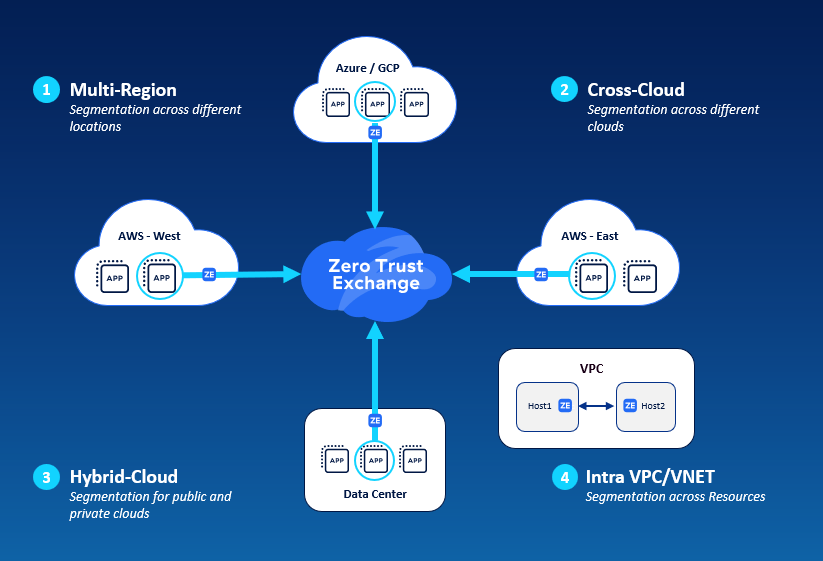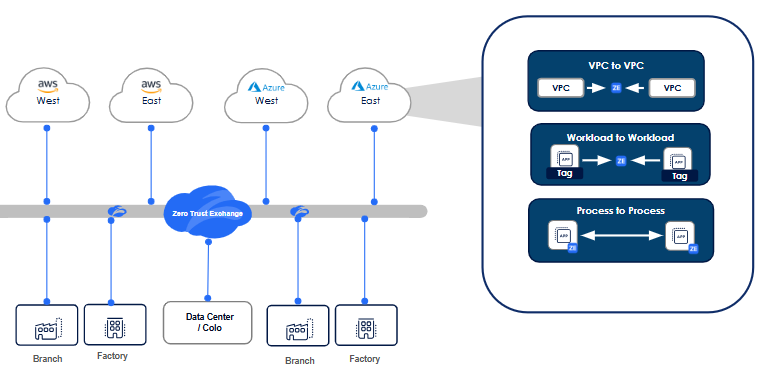Zscaler Blog
Get the latest Zscaler blog updates in your inbox
Zero Trust Meets Multicloud: A Guide to Secure Workload Segmentation
As businesses migrate applications from traditional data centers to the cloud, they face new challenges in securing them effectively. The attack surface and potential blast radius have expanded, compliance and regulatory requirements have become more stringent and lateral threat movement is still unabated.
Much of this chaos can be attributed to the reliance on old architectures being extended to the cloud. Legacy tools like firewalls and VPNs were not designed to support the dynamic nature of workloads being spun up and down in the cloud. Workloads can span various infrastructure boundaries—cross-cloud, cross-regions, cross-VPCs/VNETs—making it difficult to provide consistent security policies for workloads in the data center.
Workload Segmentation with the Zscaler Zero Trust Cloud
To restore order amidst this chaos, Zscaler has unveiled new innovations to segment workloads across multiple clouds, regions, availability zones, and processes. With expanded support for architectural components that bring zero trust to Azure, GCP, and AWS environments, these advancements empower customers to secure workloads in a true hybrid cloud setting.
- Workload visibility: Realtime discovery service is now expanded to cover AWS/Azure and GCP. With support for multiple accounts across multiple regions in a public cloud, customers can truly think of a cross-cloud global namespace to write security policies
- Workload identity: Security teams working with Azure can now identify workloads by applying User-defined tags along with other cloud metadata attributes and network constructs (FQDN/ Subnets)
- Workload authentication: Coming soon to the portfolio is the capability to support workload authentication based on JSON web tokens!

It is imperative that a modern segmentation solution should be built ground up based on cloud-first principles. Watch this short video from Brian Deitch (Chief Technology Evangelist, Zscaler) on how this works.
Segment Processes Inside a Host with Zscaler Microsegmentation
A host based approach now extends the Zscaler platform to segment processes deployed within a VPC/VNET. Customers can now extend the Zscaler zero trust architecture to segment processes deployed in the hybrid cloud.
- Real-time visibility: Zscaler delivers unparalleled visibility into traffic flows, allowing businesses to understand the interactions between hosts, initiators, and receivers of traffic. This traffic flow-based analysis is crucial for identifying potential vulnerabilities and ensuring that workloads are properly segmented.
- Intelligent segmentation: Leveraging AI-driven assistance, Zscaler provides intelligent configuration recommendations. The platform groups resources based on various attributes and traffic flows. Once these groups are identified, Zscaler recommends which groups can communicate with each other, ensuring optimal segmentation and security.
- Policy enforcement across hybrid cloud deployments: Zscaler's policy enforcement capabilities extend across hybrid cloud environments, including multiple cloud regions. This ensures that security policies are consistently applied, regardless of where workloads are hosted. By enforcing policies uniformly, Zscaler helps businesses maintain a strong security posture and comply with regulatory requirements.

Watch this video from Daniel Perkins, Principal Product Specialist, Zscaler Microsegmentation, to learn more.
As businesses continue to migrate applications to the cloud, the need for effective workload segmentation has never been greater. New innovations from Zscaler deliver a comprehensive solution that offers visibility, intelligent configuration recommendations, and robust policy enforcement. Click here to learn more about Zero Trust Cloud from Zscaler.
Learn more about Zero Trust Cloud at our launch page.
Was this post useful?
Disclaimer: This blog post has been created by Zscaler for informational purposes only and is provided "as is" without any guarantees of accuracy, completeness or reliability. Zscaler assumes no responsibility for any errors or omissions or for any actions taken based on the information provided. Any third-party websites or resources linked in this blog post are provided for convenience only, and Zscaler is not responsible for their content or practices. All content is subject to change without notice. By accessing this blog, you agree to these terms and acknowledge your sole responsibility to verify and use the information as appropriate for your needs.
Get the latest Zscaler blog updates in your inbox
By submitting the form, you are agreeing to our privacy policy.




